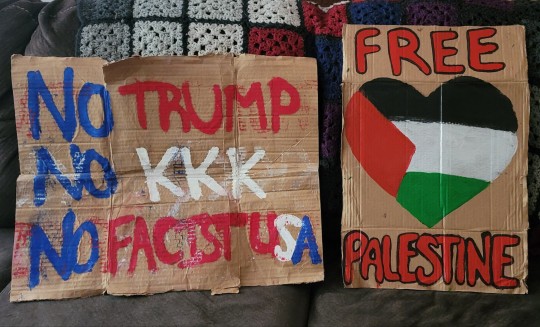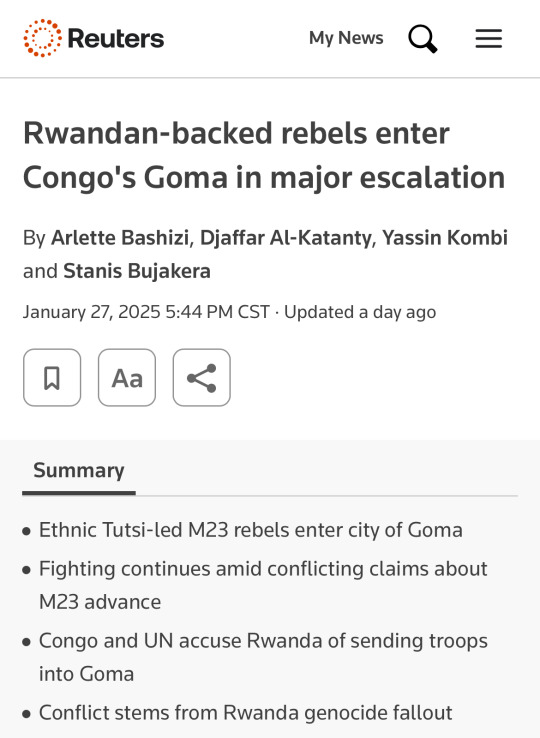#drc news
Explore tagged Tumblr posts
Text

🇺🇬🇨🇩 🚨 UGANDA BEGINS WITHDRAWEL OF 1'000 TROOPS FROM PEACEKEEPING MISSION IN DEMOCRATIC REPUBLIC OF CONGO
The Ugandan Military began the withdrawal of 1'000 troops deployed in the east of the Democratic Republic of the Congo for the regional peacekeeping force stationed in the country.
The move comes after Kinasha's Military issued a statement late Friday announcing a decision not to extend the mandate of the East African Community Regional Force (EACRF) beyond Dec. 8th.
According to the statement, the pull-out of Military assets in a phased manner, gradual and orderly, and sequentially deployed in March, 2023 will end on Jan. 7th, 2024.
"UPDF will ensure to expedite the pull-out of its forces and equipment within the approved timelines as enshrined in the extraordinary meeting of EAC CDFS (Chief of Defense Forces) held on Dec. 6," said Capt. Ahmad Hassan Kato, UPDF's contingent spokesperson.
CDF's meetings in Arusha, Tanzania, upheld DRC's decision and recommended to EAC defense ministers that EACRF officially ceases operations in the east African country, with immediate effect from Dec 8th.
Following the decision, Uganda, Burundi, Kenya, and South Sudan deployed troops to the region, which was endorsed and adopted by the regional leaders at the 3rd East African Community Heads of State Conclave on Peace and Security in eastern DRC, held in Nairobi last June.
"Uganda contingent urges all armed groups (in eastern DRC) to facilitate the withdrawal of the UPDF troops by observing total ceasefire so as to allow the forces to exit from the mission area safely," said Kato.
According to the Ugandan Military, other troops deployed to the eastern DRC as part of a joint military operation with their Congolese counterparts will continue the hunt against the Allied Democratic Forces in the region.
Via@XinhuaNews
#source
@WorkerSolidarityNews
#uganda#dr congo#drc#congo#uganda news#drc news#allied democratic forces#eastern congo#democratic republic of the congo#military news#east african community regional force#eacrf#africa#africa news#politics#geopolitics#war#wars#war news#world news#news#african news#east africa#global news#international news#breaking news#current events#global politics#international affairs#international politics
11 notes
·
View notes
Text

A rebel group with alleged links to Rwanda this week seized Rubaya, a mining town in eastern Congo known for producing a key mineral used in smartphones, the group said Thursday in a statement. In a statement shared with The Associated Press, a spokesperson for the M23 rebel group said the town was “liberated.” The Congolese army declined to comment on the situation. The decades long conflict in eastern Congo has produced one of the world’s worst humanitarian crises, with over 100 armed groups fighting for control of the mineral-rich area near the border with Rwanda. Many groups are accused of carrying out mass killings, rapes and other human rights violations. The violence has displaced about 7 million people, many beyond the reach of aid. The town of Rubaya holds deposits of tantalum, which is extracted from coltan, a key component in the production of smartphones. It is among the minerals that was named earlier this month in a letter from Congo’s government questioning Apple about the tech company’s knowledge of “blood minerals” being smuggled in its supply chain. “The fall of Rubaya is in a way the embodiment of this systemic plundering,” Ernest Singoma, a civil society activist in Goma, told the AP on Thursday. There’s been an upsurge in fighting in recent months between M23 rebels and Congo army forces, and it comes as the United Nations plans to withdraw peacekeepers from the region by the end of the year.
322 notes
·
View notes
Text

protest signs I wish I could retire by now 2016 / 2023
[daily click for Palestine] [save a family in Gaza] [esims for Gaza] + [save a life in Sudan] & [support Lebanon] + [US Abortion Funds] [US Transgender Mutual Aid] [US National Bail Fund]
#more individual fundraisers in this tag:#from the river to the sea#and reblogged to my personal:#@digitalcockroach#updated with new links#some of the old ones were dead#and some new ones felt relevant to add post-election#if anyone has links to good donation resources for Yemen or the DRC those are high on my priority list to get on here as well
211 notes
·
View notes
Text
The African Union’s health watchdog has declared a public health emergency over the growing mpox outbreak on the continent, saying the move is a “clarion call for action”. The outbreak has swept through several African countries, particularly the Democratic Republic of Congo (DRC), where the virus formerly called monkeypox was first discovered in humans in 1970. “With a heavy heart but with an unyielding commitment to our people, to our African citizens, we declare mpox as public health emergency of continental security,” Jean Kaseya, head of the Africa Centres for Disease Control and Prevention (Africa CDC), said during an online media briefing. “Mpox has now crossed borders, affecting thousands across our continent, families have been torn apart and the pain and suffering have touched every corner of our continent,” he said. [...]
Continue Reading.
181 notes
·
View notes
Text
This is how we should be leaving 2024.
instagram
Vetted Gaza Evacuation Fundraiser List
Doctors Without Borders
Ele Elna Elak
International Rescue Committee for the DRC
Save the Children of the DRC
Native American Rights Fund
Direct Relief
Asking my friends and followers to please do what you can, pay attention as much you can, and help as much as you can. Believe in and fight for a better world.
#free palestine#palestinian genocide#anti capitalism#new years#new year 2025#donate#dr congo#congo genocide#free congo#native american#vetted fundraisers#doctors without borders#ele elna elak#DRC#IRC#NARF#direct relief#Instagram#donations
21 notes
·
View notes
Text
some book recommendations to understand and know more about congo :
Lumumba : Africa's Lost Leader by Leo Zeilig

Spies in the Congo : The race for the ore that built the atomic bomb by Susan Williams

White Malice : The CIA and the neocolonisation of Africa by Susan Williams

The Congo from Leopold to Kabila by George Nzongola- Ntalaja

please add more!
#congo#congo thread#drc#democratic republic of the congo#congo genocide#books#book recommendations#genocide#usa#the congo#history#current events#current news#the drc
29 notes
·
View notes
Text
#democratic republic of the congo#dr congo#free congo#save congo#congo#drc#big tech#technology#tesla#apple computers#apple phone#apple news#apple music#apple tv#apple watch#apple#samsung phones#samsung phone#samsung#samsung tv#google phone#google maps#google play#google tv#google music#google
70 notes
·
View notes
Text
*giving myself a pep talk in the mirror* don't give the book a star just because it wasn't physically painful to read
#it's grim out there guys#ok grim isn't really fair. it's aggressively mediocre#and so when I get assigned a drc that's genuinely well written I'm tempted to start flinging stars just for that#but no. you need to impress me with more than prose that's not actively distracting#(my new habit in bookstores is finding books I was assigned and seeing if my review got printed in them)#so far i've only seen it once in one of my few starred reviews#but my other starred reviews have the review on their publisher page so I bet if I found them in print it might be there#a fun little easter egg just for me
13 notes
·
View notes
Text
#DRC#Congo#military court#attempted coup#Democratic Republic of Congo#News#Protesters#political prisoners
6 notes
·
View notes
Text
Been following this story as it develops and… fucking hell.


Reports that DRC government forces lost the airport, that civilians are without power and water and food, of street-by-street fighting through Goma, and of mass rapes.
#DRC#democratic republic of the congo#Goma#I’ve started using DuckDuckGo as a search engine#and just cannot access the original article for a lot of the sites reporting on it#because DuckDuckGo primarily offers me original articles through ‘🦋MSN’ -> the MicrosoftCorp news app— in the search results#as opposed to the original article that is not technically ‘paywalled’ behind Microsoft app access
3 notes
·
View notes
Text
Textile History: Silk

YouTube: crafty.caravan
Keep an eye out for my partners YouTube series coming out next week (June 7th) !! I’m basically their social media manager and I’ll be posting some fun things for them!!
Their channel will have vlogs (such as the one being edited right now of their first Testosterone shot) and videos like their Textile History series, a look into the history and impact of textiles around the world.
You can also find them on TikTok!
Expect to see lighthearted videos, but they also discuss active genocides happening such as Palestine and the DRC.
More coming out soon!!
#youtube#textiles#palestine#free drc#free palestine#queer#testosterone#hrt#activism#vlog#content creator#new creator#PLEASE RB
8 notes
·
View notes
Text
I'm tired of y'all "what side are we on again ?☹️🥺"
"I just don't know anything about politics🥺☹️🫣😖"
Stfu. Learn?
We are in a time where information has never been more easily accessible.
Please get a grip on the realities of the world right now.
#oh so the welfare of millions of people doesnt matter to you?#like how self centred are you?#anyway#from the river to the sea palestine will be free#keep eyes on sudan#free congo#armenian genocide#fuck the idf#fuck the police#and fuck the institutions that got us here#leftist politics#us politics#uk politics#world news#human rights#gaza#rafah#palestine#free drc#free sudan
11 notes
·
View notes
Link
Fred Richani interviews activist, filmmaker, and Focus Congo founder Pappy Orion, shedding light on his remarkable charity work in the Democratic Republic of Congo.
The interview also covers the pressing issues of genocide, war, M23, western imperialism, and the exploitation of labor for cobalt, coltan, and other resources. Pappy Orion shares insights on how we can support the DRC and delves into his incredible childhood journey on foot, spanning from Congo all the way down to South Africa in search of safety and a better life. This is a touching and heart wrenching conversation on activism, resilience, faith, tragedy, and perseverance.
#tsc news#fred richani#richani#pappy orion#focus congo#congolese#congo#democratic republic of the congo#drc#tsc
6 notes
·
View notes
Text
Authorities in the Democratic Republic of the Congo (DRC) have begun vaccination against mpox, nearly two months after the disease outbreak that spread to several countries was declared a global emergency by the World Health Organization. Some of the 265,000 doses donated to the DRC by the EU and the US were administered in the eastern city of Goma in North Kivu province, where hospitals and health workers have been overstretched, struggling to contain the new and possibly more infectious strain of mpox.
Continue Reading.
24 notes
·
View notes
Text
The truth about Congolese Cobalt Mines and the mothers and children working them so you can have a fancy iPhone.
youtube
"The most fortunate tunnel diggers in Kasulo (DRC) earn around $3'000 per year, the most fortunate. By way of comparison, the CEO's of the technology and car companies that buy the Cobalt mined from Kosulo earn $3'000 in an hour and they do so without having to put their lives at risk each day that they go to work."
#DRC#democratic republic of the congo#africa news#africa#mining#african mining#mining in africa#mining in the congo#congo#child labor#tech companies#neoliberal capitalism#socialism#communism#marxism leninism#socialist politics#socialist worker#socialist news#marxism#socialist#communist#marxist leninist#progressive politics#politics#worker solidarity#workersolidarity#african labor#workers rights#us news#news
49 notes
·
View notes